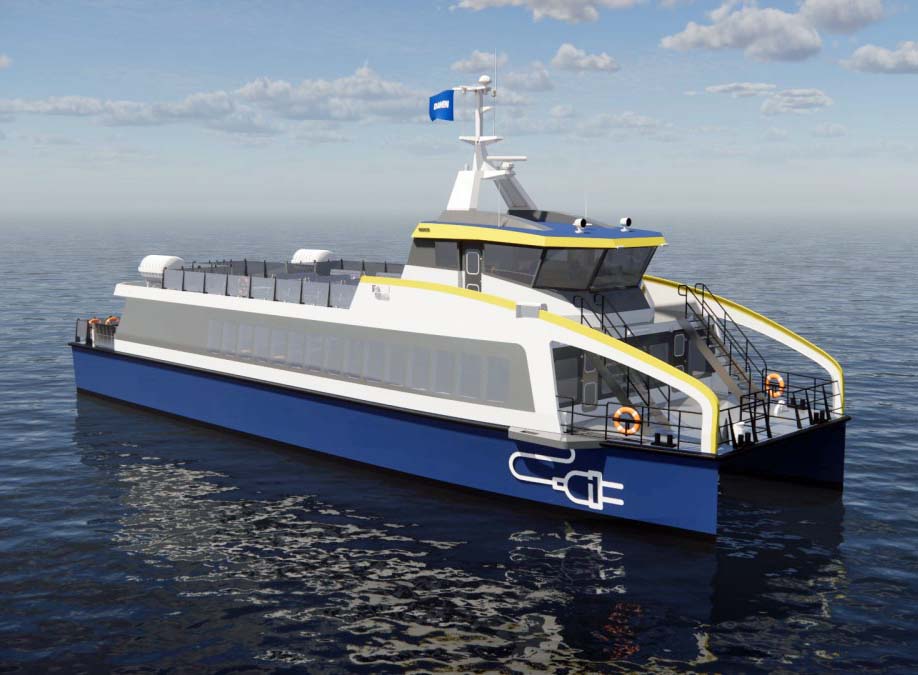Like Damen, with its ambitions to be the world’s most sustainable shipbuilder, German ferry operator Reederei Norden-Frisia has a vision for a green future, and is joining with Damen Shipyards to build a new all-electric ferry.
The company operates services from the mainland of north-west Germany to the Frisian Islands, and as ‘green’ initiatives it offers electric car and bicycle hire to its clients, and is installing solar panels and wind turbines to its car parking facilities to generate 5MW of electricity, allowing passengers’ vehicles to be fully charged and on their return.
Norden-Frisia Marine Superintendent Michael Garrelts said: “We’ve taken some good steps towards increasing sustainability on land. Around two years ago we decided it was time to take a look at our fleet.”
Before making decisions on future-proofing the fleet, Frisia first performed research, finding there were numerous passengers who would welcome a faster service to the islands.
Garrelts continued: “We saw that there were a lot of people who were arriving at the terminal by train, or were car sharing. We wanted to offer those people who were not dependent on transporting a vehicle the choice to take a faster ferry. We were aware there was demand for this. We’ve already had some experience with serving these sorts of passengers. For a while now, we’ve operated a number of conventional propulsion water taxis to the island of Juist. These cater for people who just want to get to the island as quickly as possible.”
And so the company decided it was time for construction of a fully electric vessel that would be able to transport 150 passengers at a time from Norddeich to the island of Norderney, quickly, cleanly and in comfort. The decision raised its own challenges. Principal amongst these was where to build such a vessel. In 150 years of operation, Reederei Norden-Frisia has never built a vessel outside of Germany.
Garrelts said: “Damen had the track record we were looking for. They had already built a number of fully electric vessels, some of which have already proven their reliability in operation.”
Amongst the fully electric vessels that Damen has delivered are a series of five ferries operating in the city of Copenhagen, Denmark. Additionally, the shipbuilder has been behind the construction of a fully electric harbour tug, the RSD-E Tug 2513, operating for Ports of Auckland in New Zealand. It soon became apparent that the shipbuilder may be able to assist with more than just the design and construction of a vessel.
Garrelts continued: “Initially, we only had the vessel in mind, but later on we saw that Damen was able to help us with the charging infrastructure and mooring solutions, just as they had with their earlier projects. With this, we currently have three projects underway, all in one place. It’s a very convenient and efficient process.”
Damen thus fulfilled its aim, not only to deliver efficient and sustainable ships, but to take on an integrator role, in this case including electrical infrastructure. The route required Damen to develop a completely new vessel – the Damen Fast Ferry (FFE) 3209 – known as the E-Cat Ferry.
Garrelts said: “There are a number of factors about the route that make use of a standard vessel impossible. For a start, the ferry must operate in very shallow water. In order to be able to provide a service seven times a day, the vessel’s maximum draft must be no more than 1.2m. It’s a challenge, but Damen managed to find a solution. Damen have really thought along with us. For example, we initially wanted to integrate water jets to the vessel. However, Damen pointed out that using fixed pitch propellers would offer greater efficiency.”
The Wadden Sea, in which the Frisian islands are located, is a protected UNESCO World Heritage site. This imposes a number of strict criteria on vessels operating in the waters, one of which is a speed restriction of 16 knots maximum. Even with this restriction in place, the E-Cat Ferry cuts the transit time to Norderney in half – to just one hour. Charging, which takes place in just 30 minutes, can be done while passengers are embarking and disembarking.
The project has reached a significant milestone with tank testing in Duisburg. Once the hull has been constructed at Damen’s yard in Kozle, Poland, it will be transported to Damen Shipyards Gorinchem for outfitting. The vessel is scheduled for delivery to Norden-Frisia in May 2024.
Garrelts concluded: “This is a very exciting moment. The ferry will be the first fully electric seagoing vessel to sail under German flag. I am confident, however, that it will not be the last. More and more passengers are consciously looking to contribute to the energy transition, and I can see demand for the type of vessel growing in the coming years. As a result of that, I expect the whole of Germany will be paying close attention to the construction of this ferry.”



